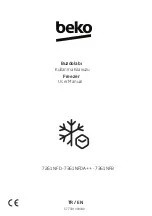
9
FREEZER FEATURES
This manual covers several different models. The freezer you have
purchased may have some or all of the items listed. The locations
of the features may not match those of your model.
Refrigerated Shelves
(on some models)
Your freezer is equipped with refrigerated interior shelves.
Packages in direct contact with the shelves will have the best
refrigeration. Fresh, unfrozen food packages should be stored
directly on the shelves and not on top of already frozen food
packages.
When placing the food packages in your freezer, please
remember:
■
The cabinet shelves have the best freezing capability. The
door shelves and the bottom of the cabinet have a slightly less
cold temperature. Therefore, packages sensitive to
temperature (meat, poultry, etc.) should not be placed on the
door shelves or the freezer bottom.
■
Leave some space between the food packages so that cold
air can pass over and around them.
Door Bin
To remove and replace the bin:
1. Remove the bin by tipping the front of the bin forward and
sliding out.
2. Replace the bin by sliding it in above the desired support
tilting it back into place.
Storage Basket
(on some models)
The slide out basket provides separate storage space for items
that are difficult to store on freezer shelves. To remove the basket,
pull out and lift up.
Storage Gate
(on some models)
To Lower and Raise the Storage Gate:
1. Lift the top of the gate up slightly, out of the supports. Pull the
gate forward and down.
2. Return the gate to the upright position. Lift the top of the gate
slightly to clear the supports. Lower the gate into the
supports.
FREEZER CARE
Cleaning Your Frost-Free Freezer
(some models)
Frost-free means that you will not have to defrost your freezer.
Frost is removed by air moving and collecting any moisture and
depositing it on the cooling coil. The cooling coil periodically
warms up enough to melt the frost, and it then flows down to the
drain pan (located behind the base grille) where it is evaporated.
Complete cleaning should be done at least once a year.
1. Unplug freezer or disconnect power.
2. Remove all frozen food. Wrap frozen food in several layers of
newspaper and cover with a blanket. Food will stay frozen for
several hours. You may also store frozen food in a cooler,
additional refrigerator-freezer, or in a cool area.
3. Wash the inside walls with a solution of mild detergent in
warm water or 2 tbs (26 mg) baking soda to 1 qt (0.95 L) warm
water.
■
Do not use abrasive or harsh cleaners such as window
sprays, scouring cleansers, flammable fluids, cleaning
waxes, concentrated detergents, bleaches or cleansers
containing petroleum products on plastic parts, interior
and door liners or gaskets. Do not use paper towels,
scouring pads, or other harsh cleaning tools. These can
scratch or damage materials.
4. Rinse well and wipe dry with a clean soft cloth.
5. Use the appropriate cleaning method for your exterior finish.
Painted metal: Wash exteriors with a clean sponge or soft
cloth and a mild detergent in warm water. Do not use abrasive
or harsh cleaners, or cleaners designed for stainless steel. Dry
thoroughly with a soft cloth.
WARNING
Explosion Hazard
Use nonflammable cleaner.
Failure to do so can result in death, explosion, or fire.










































